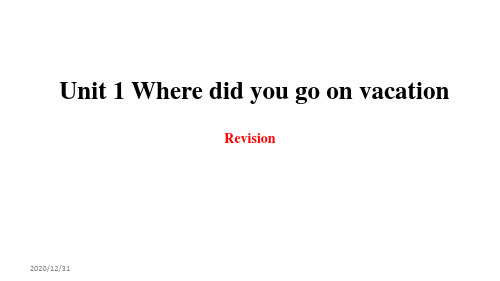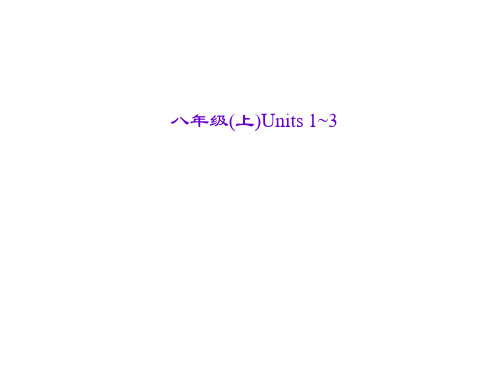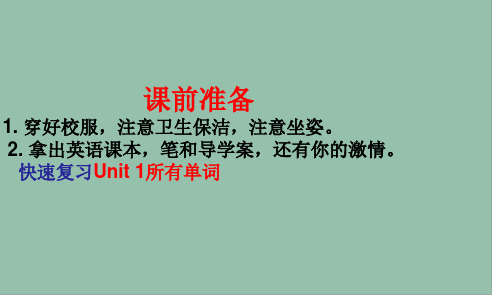人教版八年级英语上册复习课件全套
合集下载
期末总复习课件(共47张PPT) 人教版英语八年级上册.ppt

例如:He likes apples.他喜欢苹果。 ( 主语是He, likes 是动词第三人称单数形式)
一般现在时的关键词:always,(总是),often(经常), usually (通常), never从未;every day每天, every week每周, every year每年, sometimes有时候, at times时常。
A.as better as B.as good as √C.as well as
( )8.The programs on Channel 10 are ____better than Channel 5.
A.more
√B.much
C.many
( )9.He is _____than any other students in his class.
A.cold B√.colder
C.coldest
( )14.Which city is______,Bei jing,Shang hai or Liuzhou?A.bigB.bigger
√C.the biggest
模块5和6:动词不定式 (1)、(2)和双宾语。 1.动词不定式(带to的动词):to+动词原形(注:to do代表不定式) 例如:She wants to see her aunt.她想去看望她的阿姨。
( )4.I______ my homework when my mother came home.
A.am doing √B.was doing C.did ( )5.She often ______ shopping with her mother.
A√.goes B.go C.went ( )6.We_____swimming tomorrow afternoon.
一般现在时的关键词:always,(总是),often(经常), usually (通常), never从未;every day每天, every week每周, every year每年, sometimes有时候, at times时常。
A.as better as B.as good as √C.as well as
( )8.The programs on Channel 10 are ____better than Channel 5.
A.more
√B.much
C.many
( )9.He is _____than any other students in his class.
A.cold B√.colder
C.coldest
( )14.Which city is______,Bei jing,Shang hai or Liuzhou?A.bigB.bigger
√C.the biggest
模块5和6:动词不定式 (1)、(2)和双宾语。 1.动词不定式(带to的动词):to+动词原形(注:to do代表不定式) 例如:She wants to see her aunt.她想去看望她的阿姨。
( )4.I______ my homework when my mother came home.
A.am doing √B.was doing C.did ( )5.She often ______ shopping with her mother.
A√.goes B.go C.went ( )6.We_____swimming tomorrow afternoon.
人教版八年级英语上册复习课件全套

04 话题训练
During the summer holiday, Nick's father took him and their dog Cookie to Red Mountain. It's a beautiful place. They had a happy trip there. In the morning , they went hiking and took many photos on the way. At noon,they had a picnic. In the afternoon, they went boating. It was dark and they had to go home. It was really a happy trip!
It was really a happy trip!
04 话题训练
Useful expressions: 1. It's an interesting place. 2. It's a beautiful place. 3. They have great fun. 4. It was really a happy trip.
A holiday trip
In the morning Went hiking,Took photos
At noon
Had a picnic(野餐)
In the afternoon Went boating
该题要求学生运用一般过去时来叙述发生在过去的事情。 写作时,要先交代时间、人物、地点;再按时间顺序写出活 动内容;最后,写旅行的感受。
They worked... Did they work...? They did not work...
人教版八年级英语上册复习课件

01 复习目标
1. 熟练掌握本单元的重点词汇和短语。 2. 熟练掌握本单元的语法点。 3. 熟练掌握本单元的话题写作。
03 考点集训
考点一:How often的用法
1. how often是对动作发生的“次数”提问,询问的是频率“多 久一次”。回答可以是:Every day./ Once a week./Three times a week./ Often./ ...
04 话题训练
During the summer holiday, Nick's father took him and their dog Cookie to Red Mountain. It's a beautiful place. They had a happy trip there. In the morning , they went hiking and took many photos on the way. At noon,they had a picnic. In the afternoon, they went boating. It was dark and they had to go home. It was really a happy trip!
04 话题训练
During the summer holiday,_____________________________________ _________________________________________
In the morning ________________________________ At noon ______________________________________ In the afternon ________________________________
最新人教版八年级英语上册复习课件全册

death (n.)死;死亡 16.die(v.)→________ →_______ dead (adj.)死的 →________ dying (现在分词)
wrote (过去式) 17.write(v.)→________
→_________ written (过去分词)书写;写 →_______ writer (n.)作者;作家【高频】 well (adv.)好地 18.good(adj.)→ _______ →________ better (比较级)较好的(地);更好的(地)【高频】 best (最高级)最好的(地)【高频】 →______ loudly (adv.)喧闹地;大声地;响亮地 19.loud(adj.)→________ 20.quiet(adj.)→________ quietly (adv.)轻声地;轻柔地;安静地
hungry (adj.)饥饿的 9.hunger(n.)→_______ dislike (反义词)不喜爱(的事物);厌恶(的事物) 10.like(v.&n.)→________
11.one(num.)→______ once (adv.)一次;曾经 twice (adv.)两次;两倍 12.two(num.)→______ 13.swing(v.)→_______________ (过去式) swung/swang →______ swung (过去分词) swinging (现在分词)摇摆,摆动 →____________ 14.little(pron.)→____ less (比较级)较小的;更小的 least (最高级)最小的;最少的 →_____ healthy (adj.)健康的;强健的 15.health(n.)→________ healthily (adv.)健康地 →_____________
人教版八年级英语上册期末复习课件全册

said the tour guide.
A. few
B. little
C. many
D. much
6.[2015省卷51题]—How is your old friend Katie?
—Oh, she′s moved to another city, so I′ve D ever seen her since then.
考点小练
7.我们没有足够的时间来完成这项工作。 We don′t have enough time to finish this work. 8.Tom doesn′t do his homework C ,so he always makes many mistakes.
A. enough careful
1.I was on vacation last month. 上个月我在度假。
6.She says it′s good for my health to drink milk every day.
2.Did you doanything special ?你做一些特殊的事情了吗? 她说每天喝牛奶有助于我的健康。
某事考Leabharlann 小练5.这条裙子对于她来说太贵了,因此她决定不买它。
The skirt is too expensive for her, so she decided not to buy it.
6.商店里有那么多种类的包。我不能决定买哪一个。
There are so many kinds of bags in the shop. I can′t decide which to buy .
13.from the top of the hill 从山顶上 14.take some photos 拍一些照片 15.learn something important 学一 些重要的东西 16.Tian'anmen Square 天安门广场 17.the Palace Museum故宫博物馆 18.Beijing hutong 北京胡同
人教版八年级上册英语复习课件

•
As for the story,you'd better not believe it. 关于那故事
,你最好不要相信。
• 翻译:至于我自己,我现在不想去。 (As for myself, I don’t want to go now. )
• 至于那个人,我什么都不知道。(As for the man, I know nothing about him.)
• 锻炼
• 14. make a difference to • 对什么有影响
• 15. how often
• 多久一次 • 16. although = though • 虽然 • 17. most of the students=most students
• 18. shop=go shopping=do some shopping
different from yours? be the same as … / be different from … • 14. What sports do you play ? • 15. A lot of vegetables help you to keep in good health . • keep in good health = keep healthy = stay healthy • 16. You must try to eat less meat . • try to do sth.表示“ 尽力做某事 ” ,不包含是否成功的意思,less是
• 购物
• 19. as for
• 至于
3
• 20. activity survey
• 活动调查 • 21.做家庭作业 • do homework • 22.做家务事 • do house work • 23.吃更少的肉 • eat less meat • 24.垃圾食物 • junk food • 25.对什么有益 • be good for • 26.对什么有害 • be bad for • 27. 想做某事 • want to do sth • 28.想某人做某事 • want sb to do sth
Unit1++复习课件 人教版八年级英语上册

常考句子
1.---Where did you go on vacation? ---I went to New York City. 2. ---Who did you go there with? ---I went there with my family. 3. ---Did you buy anything special? ---No, I bought nothing. 4. ---How was the food? --- Everything tasted really good. 5. ---Did you go anywhere interesting? ---Yes, I went to Guizhou with my family.
自主检测 早读
1.复习课本P1-p.8页单词 2. 复习课本142.页不规则动词表
要求:1.提问本单元重点单词并检测 2.再次记忆错误单词
Task2重点短语
要求: 1.背诵重点短语 2. 检测-- 再次背诵
1.anyone任何人 2.anywhere在任何地方 3. wonderful精彩的,绝妙的 4.few不多,很少 5.most最多,大多数 6.wonderful精彩的 7.few不多 很少 8. most最多,大多数 9.something某事
相当多
11.go shopping
购物
11. stay at home
待着家里
12. in the countryside
在乡下
13. along the way
沿途
14. another two hours=two more hours另外两小时
15. because of
因为
人教版八年级英语上册Units1-5单元知识复习课件

screen
big/small big /small
distance close/far close /far
sound
good/bad the /the
movie new/old new /old
seat comfortable uncomfortable
comfortable
I. 单项选择:
What do you think of...?
C. happily
D. happiest
4.—What do you think of maths, John?
—For me, maths is ______ than any other subject.
A. difficult
B. mBore difficult
C. most difficult D. the most difficult
B. How often
C. How far
D. How much
习惯用法、搭配
1. help sb. with sth 帮助某人做某事 2. How about…? =What about…? ….怎么样?/ ….好不好?3. want sb. to do sth. 想让某人做某事 4. How many + 可数名词复数+ 一般疑问句 ….有多少…..5. 主语+ find+ that 从句 …发现… 6. It’s + adj.+ to do sth. 做某事是….的7. spend time with sb. 和某人一起度过时光 8. ask sb. about sth. 向某人询问 某事9. by doing sth. 通过做某事 10. What’s your favorite…..? 你 最喜欢的……是什么?11 start doing sth. 开始做某事 12. the best way to do sth. 做某事的最好方式
- 1、下载文档前请自行甄别文档内容的完整性,平台不提供额外的编辑、内容补充、找答案等附加服务。
- 2、"仅部分预览"的文档,不可在线预览部分如存在完整性等问题,可反馈申请退款(可完整预览的文档不适用该条件!)。
- 3、如文档侵犯您的权益,请联系客服反馈,我们会尽快为您处理(人工客服工作时间:9:00-18:30)。
根据句意用方框里的词填空。 something, anything, nothing, everything, someone, anyone, no one, everyone
03 考点集训
(4)中间去e末尾加t。 feel→felt,keep→kept,sleep→slept,sweep→swept,meet→met, feed→fed 助记:动词中间两个e,去掉一个后加t;d来结尾,去e之后不加t。
(5)把i变为o。 ride→rode,drive→drove,write→wrote 助记:动词过去式变i为o的单词:“骑(马)”“开(车)”“写(字)”。
home and ____d_i_d___ (do) some cleaning.
03 考点集训
考点二:复合不定代词
some, any, no, every与-one, -thing可以组成不同的不定代词。加上where构成不定副词。some-不定代词,通常用于肯定句中;any-不定代词 则多用于否定句、疑问句和条件状语从句中。但some-可用于表请求、邀 请、预料对方会作肯定回答时的疑问句中。 形容词修饰不定代词时,通常要放在不定代词之后。
Could you give me something to eat?你可以给我一些吃的东西吗? There is something wrong with your eyes.你的眼睛有点问题。
03 考点集训
-thing 事物
-body 人
-one 人
-where 地方
every每个 everything
03 考点集训
(4) 以重读闭音节结尾的动词, 末尾只有一个辅音字母, 先双写这个辅 音字母, 再加ed
shop→shopped;stop→stopped 读音规则注意:清辅音后读/t/;浊辅音和元音后读/d/;辅音/t/与/d/ 后读/Id/。 2. 不规则动词的过去式的变化各异, 需要特殊记忆, 每个不规则动词 的变换形式, 都必须牢记。不规则动词的过去式变化没有统一的规则, 但并非一点规律也没有,下面我们就介绍一部分动词过去式的记忆规律。 (1)动词的过去式与动词原形一样。
---He _w_a_t_c_h_e_d_(watch) TV and __r_e_a_d___ (read) an interesting book.
03 考点集训
4. They all ___w_e_n_t__ (go) to the mountains yesterday morning. 5. She d__id_n_’_t_v_i_s_it (not visit) her aunt last weekend. She __s_t_a_y_e_d_ (stay) at
03 考点集训
用所给词的适当形式填空。 1. I ___h_a_d____ (have) an exciting party last weekend. 2. ___D__id____ she __p_r_a_c_ti_c_e_ (practice) the guitar yesterday?
No, she __d__id_n_’_t__. 3. ---What ___d_i_d___ Tom __d__o____ (do) on Saturday evening?
let→ut
03 考点集训
(2)遇见i改为a。 swim→swam , sing→sang , begin→began , sit→sat , give→gave , drink→drank 助记:游泳(swim)唱歌(sing)后,开始(begin)坐(sit)下来,给(give)点喝 (drink)的吧,i就变成a。 (3)过去式以ought和aught结尾的单词。 bring→brought , buy→bought , think→thought , catch→caught , teach→taught
03 考点集训
考点一:一般过去时
英语中的动词按其过去式的构成方式可分为规则动词和不规则动词。规则 动词的过去式由词尾ed构成,而不规则动词的变化因词而异。 1. 规则动词过去式的构成和发音: (1) 一般的动词, 直接加ed watch→watched,help→helped,work→worked (2) 以字母e结尾的规则动词, 只加d love→loved,live→lived,arrive→arrived (3) 以辅音字母加y结尾的动词, 变y为i, 再加ed study→studied,cry→cried,worry→worried
Unit 1 Where did you go on vacation
Revision
2020/6/1
C目录 ONTENTS 01 单元复习目标 02 单元词汇听写 03 单元考点集训 04 单元话题训练 05 单元实战演练
01 复习目标
1. 熟练掌握本单元的重点词汇和短语。 2. 熟练掌握本单元的语法点。 3. 熟练掌握本单元的话题写作。
everybody
everyone
everywhere
some某个 something
(sth.) somebody
(sb.) someone
somewhere
any任何 anything
anybody
anyone
anywhere
no没有 nothing
nobody
no one
nowhere
03 考点集训
(6)ow/aw变为ew。 know→knew,grow→grew,throw→threw,draw→drew
(7)以d结尾的词,把d变成t。 build→built,lend→lent,send→sent,spend→spent
03 考点集训
巧学妙记
动词一般过去时, 表示过去发生的事; be用was或用were, have,has变had; 谓语动词过去式, 过去时间作标志; 一般动词加-ed, 若是特殊得硬记。 否定句很简单, 主语之后didn’t添; 疑问句也不难, did放在主语前; 如果谓语之前有did, 谓语动词需还原; 动词若是was,were, 否定就把not添。
03 考点集训
(4)中间去e末尾加t。 feel→felt,keep→kept,sleep→slept,sweep→swept,meet→met, feed→fed 助记:动词中间两个e,去掉一个后加t;d来结尾,去e之后不加t。
(5)把i变为o。 ride→rode,drive→drove,write→wrote 助记:动词过去式变i为o的单词:“骑(马)”“开(车)”“写(字)”。
home and ____d_i_d___ (do) some cleaning.
03 考点集训
考点二:复合不定代词
some, any, no, every与-one, -thing可以组成不同的不定代词。加上where构成不定副词。some-不定代词,通常用于肯定句中;any-不定代词 则多用于否定句、疑问句和条件状语从句中。但some-可用于表请求、邀 请、预料对方会作肯定回答时的疑问句中。 形容词修饰不定代词时,通常要放在不定代词之后。
Could you give me something to eat?你可以给我一些吃的东西吗? There is something wrong with your eyes.你的眼睛有点问题。
03 考点集训
-thing 事物
-body 人
-one 人
-where 地方
every每个 everything
03 考点集训
(4) 以重读闭音节结尾的动词, 末尾只有一个辅音字母, 先双写这个辅 音字母, 再加ed
shop→shopped;stop→stopped 读音规则注意:清辅音后读/t/;浊辅音和元音后读/d/;辅音/t/与/d/ 后读/Id/。 2. 不规则动词的过去式的变化各异, 需要特殊记忆, 每个不规则动词 的变换形式, 都必须牢记。不规则动词的过去式变化没有统一的规则, 但并非一点规律也没有,下面我们就介绍一部分动词过去式的记忆规律。 (1)动词的过去式与动词原形一样。
---He _w_a_t_c_h_e_d_(watch) TV and __r_e_a_d___ (read) an interesting book.
03 考点集训
4. They all ___w_e_n_t__ (go) to the mountains yesterday morning. 5. She d__id_n_’_t_v_i_s_it (not visit) her aunt last weekend. She __s_t_a_y_e_d_ (stay) at
03 考点集训
用所给词的适当形式填空。 1. I ___h_a_d____ (have) an exciting party last weekend. 2. ___D__id____ she __p_r_a_c_ti_c_e_ (practice) the guitar yesterday?
No, she __d__id_n_’_t__. 3. ---What ___d_i_d___ Tom __d__o____ (do) on Saturday evening?
let→ut
03 考点集训
(2)遇见i改为a。 swim→swam , sing→sang , begin→began , sit→sat , give→gave , drink→drank 助记:游泳(swim)唱歌(sing)后,开始(begin)坐(sit)下来,给(give)点喝 (drink)的吧,i就变成a。 (3)过去式以ought和aught结尾的单词。 bring→brought , buy→bought , think→thought , catch→caught , teach→taught
03 考点集训
考点一:一般过去时
英语中的动词按其过去式的构成方式可分为规则动词和不规则动词。规则 动词的过去式由词尾ed构成,而不规则动词的变化因词而异。 1. 规则动词过去式的构成和发音: (1) 一般的动词, 直接加ed watch→watched,help→helped,work→worked (2) 以字母e结尾的规则动词, 只加d love→loved,live→lived,arrive→arrived (3) 以辅音字母加y结尾的动词, 变y为i, 再加ed study→studied,cry→cried,worry→worried
Unit 1 Where did you go on vacation
Revision
2020/6/1
C目录 ONTENTS 01 单元复习目标 02 单元词汇听写 03 单元考点集训 04 单元话题训练 05 单元实战演练
01 复习目标
1. 熟练掌握本单元的重点词汇和短语。 2. 熟练掌握本单元的语法点。 3. 熟练掌握本单元的话题写作。
everybody
everyone
everywhere
some某个 something
(sth.) somebody
(sb.) someone
somewhere
any任何 anything
anybody
anyone
anywhere
no没有 nothing
nobody
no one
nowhere
03 考点集训
(6)ow/aw变为ew。 know→knew,grow→grew,throw→threw,draw→drew
(7)以d结尾的词,把d变成t。 build→built,lend→lent,send→sent,spend→spent
03 考点集训
巧学妙记
动词一般过去时, 表示过去发生的事; be用was或用were, have,has变had; 谓语动词过去式, 过去时间作标志; 一般动词加-ed, 若是特殊得硬记。 否定句很简单, 主语之后didn’t添; 疑问句也不难, did放在主语前; 如果谓语之前有did, 谓语动词需还原; 动词若是was,were, 否定就把not添。
